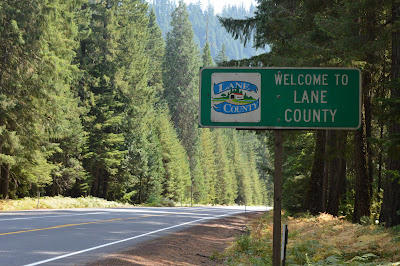Praying for Oregon Counties: Douglas
 |
| Umpqua River |
Douglas county was first established in 1852. By 1915 various boundary changes with neighboring counties resulted in the present configuration, which basically encompasses the Umpqua watershed in south-western Oregon. Roseburg is the county seat.
Interstate 5, the highway running north and south along the west coast from Canada to Mexico, bisects Douglas County. Roseburg is situated along I-5 and originally was platted in the early 1850’s at the intersection of the Umpqua River and Deer Creek. From the beginning of the mining and settlement period, Roseburg has been a hub. Aaron Rose, for whom the town was named, established the first homestead and turned his house into a tavern and inn, becoming a stop-over for pioneers and miners along a section of the Scott-Applegate trail that lead to south to California or north into the Willamette Valley.
The area was ideal for farming and pioneers began settling the area in the 1850’s.
A large portion of the county to the east is made up of the Umpqua National Forest as well as the Umpqua Wilderness. A small section of the county extends to the west all the way to the Pacific Coast and Winchester Bay. The town of Reedsport is about four miles from the ocean and is a popular tourist destination with the Oregon Dunes National Recreation area spanning about forty miles along the coast.
 |
| Parrott House, Roseburg, OR |
The economy of Douglas County has traditionally relied heavily on timber, and income from federal timber sales supported services such as healthcare, police, parks, sanitation, and libraries. After the 1990 Spotted Owl controversy, which resulted in greatly reduced timber revenue for the county, many of these services had to be cut. For a time the federal government subsidized those counties hit hardest by the reduction of federal timber sales, but that support, while renewed several times, ended in 2016. During the 2016 election a property tax bill to fund the library system was rejected and Douglas County closed all public libraries. Other services have been cut to the bone, and the county has one of the highest poverty rates in the state.
At Canyonville, a few miles south of Roseburg, the Cow Creek Band of the Umpqua tribe established the Seven Feathers Casino. Like the others in the Umpqua tribe, the members of the Cow Creek Band were ordered to relocate to a reservation in the 1850's. However, seven families of the Cow Creek Band refused to do so, hiding out and living their traditional lives in the hills and canyons of the Umpqua watershed. For years, during the mid 1800’s, they were hunted and in danger of extermination.
When the move to terminate the tribes came in the mid-twentieth century, the Cow Creek Band was able to file suit against the federal government and received a 1.5 million dollar settlement, which they have used to improve economic conditions for the tribal members. One of their investments is the Seven Feathers Casino.
 |
| Seven Feathers Casino |
The Board of Commissioners is the Douglas County governing body. It is made up of three members who are elected for four-year terms. They select a chairman among themselves and are responsible for setting the budget, appointing non-elected officials and committees, and overseeing the county departments, among other duties. Current commissioners are Chris Bois, Tim Freeman and Tom Kress.
How do we pray for Douglas County?
Repent for the sins of our fathers in the treatment of the tribes during the 1850’s. There was much injustice.
Pray for the economic development of the county. Our state as a whole needs great wisdom in protecting and managing our forests.
Margaret



Comments
Post a Comment